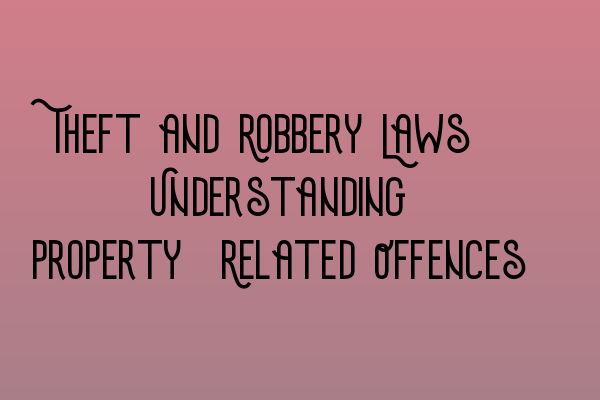Theft and Robbery Laws: Understanding Property-Related Offences
Welcome to the SQE Criminal Law & Practice Law UK blog! In this post, we will delve into the intricacies of theft and robbery laws, two property-related offences that are commonly encountered in criminal proceedings. Understanding these offences is crucial for aspiring solicitors and legal professionals who aim to excel in their career.
Understanding Theft
Theft is a property-related offence that involves the dishonest appropriation of another person’s property, with the intention to permanently deprive them of it. It is important to note that the term “property” extends beyond physical items and can include intangible assets such as intellectual property.
In order to establish the offence of theft, certain elements must be satisfied. These include the act of appropriation, the property belonging to another person, the intention to permanently deprive, and the dishonesty involved. Each element carries its own legal significance and must be carefully examined in the context of the case at hand.
If you are preparing for the SQE 1 exam, we recommend practicing with our SQE 1 Practice Exam Questions to enhance your understanding of theft laws.
Understanding Robbery
Robbery is a serious offence that involves theft, combined with the use of force or the threat of force against the victim. Unlike theft, robbery carries a more severe punishment due to its violent nature. It is essential for legal practitioners to differentiate between theft and robbery, as the penalties and legal interpretations can vary significantly.
When examining a case involving robbery, several factors will be considered, such as the level of force used, the victim’s perception of the threat, and the overall circumstances surrounding the offence. These factors play a crucial role in determining the appropriate charges and potential sentencing.
For additional practice on robbery laws, we recommend trying our SQE 1 Practice Mocks FLK1 FLK2 to strengthen your knowledge and analytical skills.
Seeking Expert Legal Guidance
Whether you are studying for the SQE exams or practicing as a legal professional, it is essential to stay updated with the latest developments in theft and robbery laws. By enrolling in our comprehensive SQE 2 Preparation Courses and SQE 1 Preparation Courses, you can enhance your understanding and application of criminal law principles.
It is important to note that the application of theft and robbery laws may differ based on jurisdiction and specific case circumstances. Seeking expert legal guidance in complex cases is crucial to ensure the best possible outcome for your clients’ rights and interests.
For information on upcoming SRA SQE exam dates, visit our article on SRA SQE Exam Dates to stay updated and plan your preparation accordingly.
Thank you for reading our comprehensive guide to theft and robbery laws. Stay tuned for more informative articles on SQE Criminal Law & Practice Law UK.
